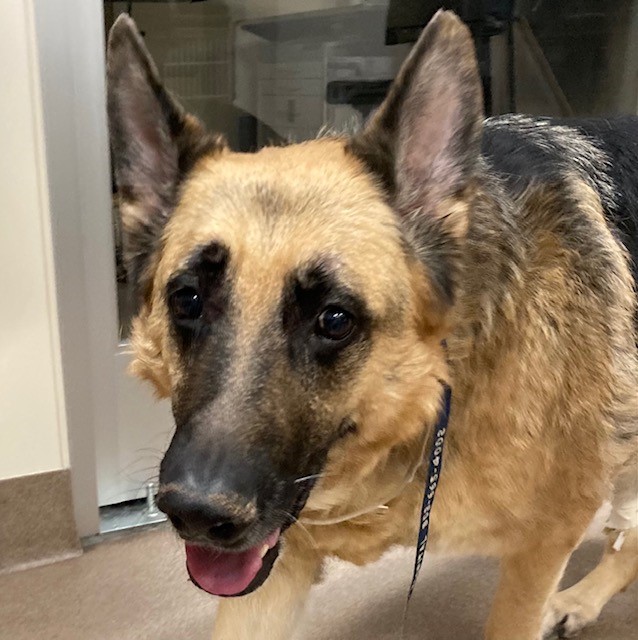Grendel joined her forever family along with her brother Beowulf at eight weeks old.
“We could tell right away she had a mischievous streak and was destined to get her brother in trouble,” said Marcia Bohannon, Grendel’s human.
The littermates have been devoted to each other from the start, which made Grendel’s illness devasting not just for Bohannon but also Beowulf.
Grendel was diagnosed with a nasal tumor in late 2020 and had her first visit at the FACC soon after.
“We decided we would move forward with treatment, to give her as long a life as possible, but we already had spent $3,000 for diagnostic tests, and we weren’t sure how we would pay for it.”
During Grendel’s first appointment at the FACC, they learned about a clinical trial for dogs with nasal tumors. In addition to providing the standard of care, the study covered many treatment costs and relieved the family’s financial worry.
“The clinical trial and financial support were welcome surprises,” said Bohannon.“More importantly, we were grateful to have a chance to help Grendel feel better.”
HOPE FOR PETS AND PEOPLE
Grendel was the first patient to enroll in a new study for dogs with sinonasal tumors.
According to radiation oncologist Dr. Keara Boss, the study’s principal investigator, the purpose of the trial is to determine how lymph node irradiation affects a patient’s immune response against cancer cells within the tumor and throughout the body.
“When a patient is diagnosed with a nasal tumor, or any head or neck cancer, there is a chance that it has or will spread to the regional lymph nodes,” said Boss. “The regional lymph nodes may be included in the radiation plan to clear out any metastatic cancer cells that may be hiding in the nodes. However, now that we know the importance of the immune system in fighting cancer, we want to understand the impact of lymph node irradiation since these nodes are important hubs in the immune stimulation process.”
Currently, there is not a consensus in veterinary medicine regarding irradiating the lymph nodes in coordination with the treatment of the primary tumor.
Because head and neck cancers in people and dogs are similar, the results of this study might inform future treatment for all cancer patients.
For Grendel, the clinical trial means returning to hide and seek with the rabbit under the deck and more time with Beo.
“As a cancer survivor, I believe any research is a good thing,” said Bohannon. “I also know that this trial has given Grendel back her zest for life, and for that, it’s worth it. I’m grateful to everyone who made this possible.”
Gifts to One Cure support our clinical trials program and comparative oncology research. Give today to support better treatments for pets and people with cancer.